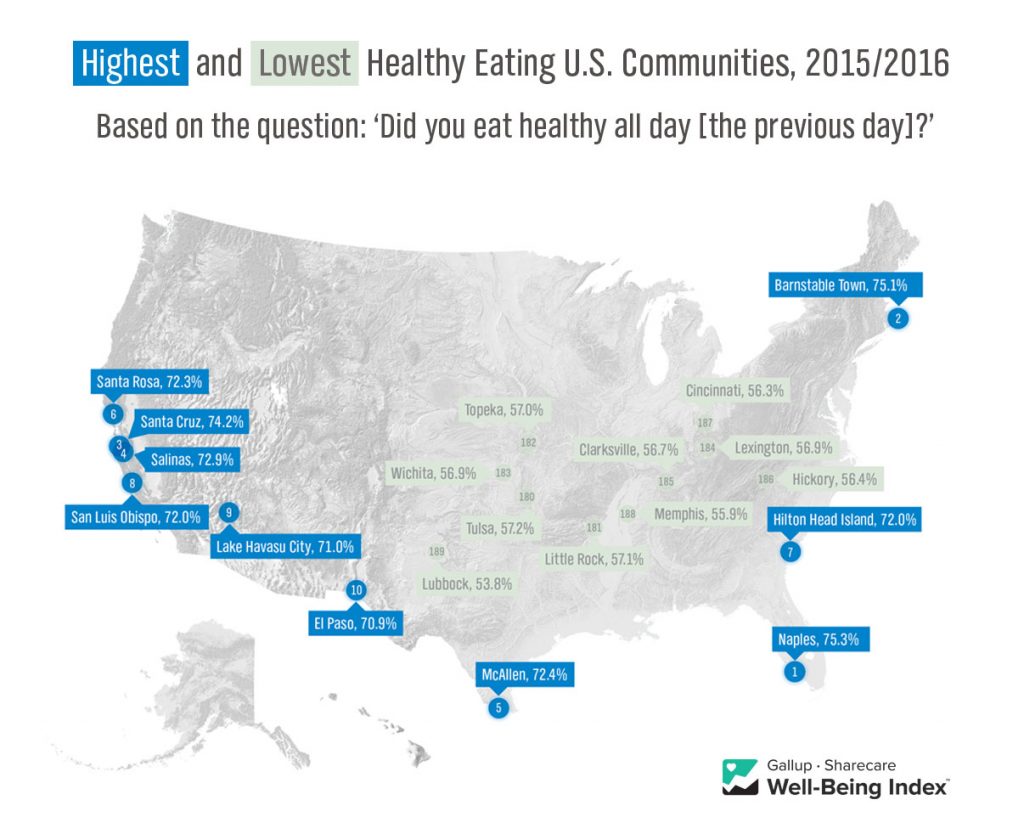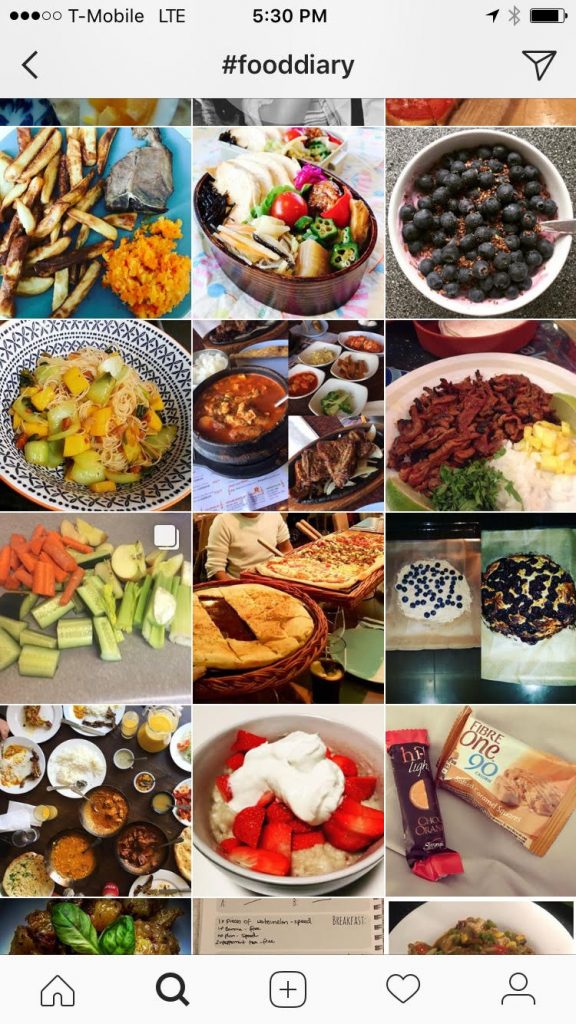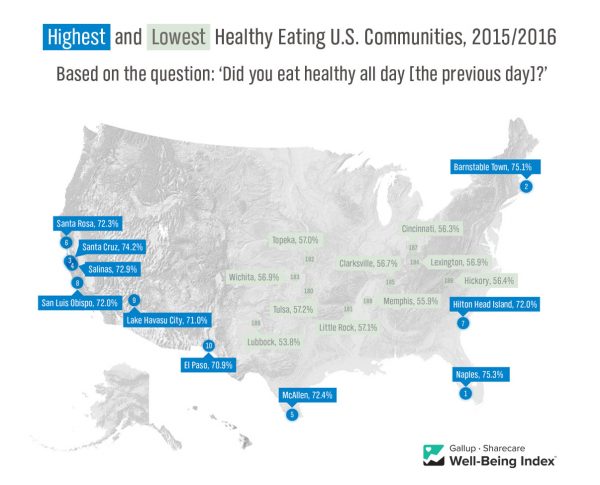 The top healthiest eating communities tend to circle the perimeter of the map of the lower 48 U.S. states. In these towns, more than 72% of health citizens report healthy eating. These areas are located in California, Florida, and Massachusetts, among others.
The top healthiest eating communities tend to circle the perimeter of the map of the lower 48 U.S. states. In these towns, more than 72% of health citizens report healthy eating. These areas are located in California, Florida, and Massachusetts, among others.
Areas with the lowest rates of healthy eating are concentrated generally south of the Mason-Dixon Line, in places like Arkansas, Kentucky, and Mississippi, and other states. In these places, fewer than 57% of people eat healthy.
Eating healthy foods in moderation is a mighty contributor to personal and public health, discussed in the report, State of American Well-Being – 2016 Community Rankings for Healthy Eating, part of the Gallup-Sharecare’s Well-Being Index project.
I had the pleasure of brainstorming this research with Michael Acker of the Blue Zones Project and Dan Witters, research director of the Index. Our conversation focused on two big factors that stood out to me that aren’t usually addressed in the primary healthcare visit: the social aspect of health, and stress.
On the social aspects of health, the Index looked at several consumer sentiments, including:
- “Relationship with my spouse, partner, or closest friend is stronger than ever.”
- “Your friend and family give you positive energy every day.”
- “There is a leader in your life who makes you enthusiastic about the future.”
- “Someone in your life always encourages you to be healthy.”
Among these, the presence of “someone in your life always encourages you to be healthy” had the biggest difference between people who ate healthy and those who did not. Friends and family giving one positive energy each day also had a proportionately larger impact on healthy eating. Christakis and Fowler’s research on being “Connected” statistically demonstrates the power of “social health.” That is, our being connected with people who are positive and living out healthy behaviors breeds positive behavior in us. The opposite is also true: negative people living unhealthy lives tend to diminish our own healthy living potential. On the other hand, having an “accountability partner,” Michael explained, bolsters personal accountability for healthy eating and is a major contributor to overall wellness, the Blue Zones research has learned.
The second stand-out finding in the Index is the role of stress on healthy eating — or, rather, unhealthy eating. Among health risks, stress had the largest negative impact on unhealthy eating — compared with obesity, diabetes, high blood pressure, high cholesterol, heart attack, and depression (either current or lifetime). And the impact of stress on poor eating was substantially higher than impacts from these other health issues. Fully one-half of people who said they didn’t eat healthy the previous day were also people under stress. Compare this to people who self-identify as obese, 33% who didn’t eat healthy the previous day, or people with high blood pressure, 26% of whom said they didn’t eat well yesterday.
Healthy eating correlates to other health behaviors, the research found: people who are good at eating fruits and vegetables tend to exercise and move around more, and do a good job managing other aspects of well-being.
 Health Populi’s Hot Points: “Love in our lives,” Mike emphasized, is a powerful social determinant of health, and social isolation takes away from well-being. New research from an interdisciplinary team at the University of Washington finds that the online social network Instagram can be a powerful force in helping people track food and eat healthy.
Health Populi’s Hot Points: “Love in our lives,” Mike emphasized, is a powerful social determinant of health, and social isolation takes away from well-being. New research from an interdisciplinary team at the University of Washington finds that the online social network Instagram can be a powerful force in helping people track food and eat healthy.
If you search Instagram with hashtag #fooddiary today, you would unearth over 3.6 million posts. Instagram has over 600 million users, and food photos are prevalent on the site. In fact, the U-W researchers note that Instagram has been mined for identifying food deserts and eating disorder behavior.
Yes, social networks are powerful in health, which I forecasted way back in 2008 in my paper, The Wisdom of Patients, published by California HealthCare Foundation. But I digress…
The research asked two key questions:
- Why and how do people keep track of their food on Instagram to support their health goals? and,
- How does social interaction affect their health tracking decisions and tracking behavior on Instagram?
The findings: participants tracked food to support themselves and others in the collective pursuit of healthy eating goals. Users sought social support for their own tracking, with the additional goal of helping other people as well. People adapted their personal tracking practices to better receive and give support.
Thus, the users of Instagram in this sample illustrated the social health bottom-line that while people gain personally for health via social networks, there’s also perceived benefits to sharing support on the self-tracking journey. “Health accountability” partners can therefore be virtually accessed in addition health-socializing with supportive mates, family and friends in-real-life.
FYI, the U-W research was sponsored by grants from the National Science Foundation, the U.S. Department of Health and Human Services’ Agency for Healthcare Research and Quality (AHRQ), a U-Washington Innovation Award, and Microsoft.





 Interviewed live on BNN Bloomberg (Canada) on the market for GLP-1 drugs for weight loss and their impact on both the health care system and consumer goods and services -- notably, food, nutrition, retail health, gyms, and other sectors.
Interviewed live on BNN Bloomberg (Canada) on the market for GLP-1 drugs for weight loss and their impact on both the health care system and consumer goods and services -- notably, food, nutrition, retail health, gyms, and other sectors. Thank you, Feedspot, for
Thank you, Feedspot, for  As you may know, I have been splitting work- and living-time between the U.S. and the E.U., most recently living in and working from Brussels. In the month of September 2024, I'll be splitting time between London and other parts of the U.K., and Italy where I'll be working with clients on consumer health, self-care and home care focused on food-as-medicine, digital health, business and scenario planning for the future...
As you may know, I have been splitting work- and living-time between the U.S. and the E.U., most recently living in and working from Brussels. In the month of September 2024, I'll be splitting time between London and other parts of the U.K., and Italy where I'll be working with clients on consumer health, self-care and home care focused on food-as-medicine, digital health, business and scenario planning for the future...